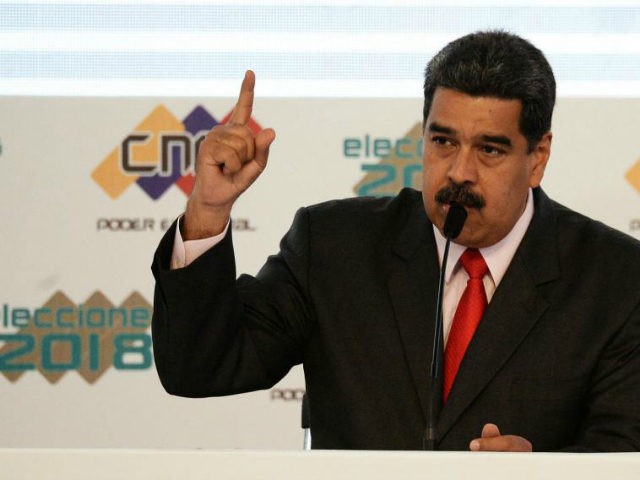CARACAS, Venezuela – Socialist dictator Nicolás Maduro proclaimed on Wednesday that the de-dollarization of world trade is “inevitable,” the latest in a series of statements against the U.S. currency.
Maduro’s regime has tolerated the replacement of the near-worthless bolivar in many financial transactions in Venezuela with the dollar after attempting, and failing, to ban its use.
“The de-dollarization of world trade is inevitable, we are living it,” Maduro posted on Twitter. “Gone will be the old world of criminal sanctions and economic manipulations, with the interest of punishing peoples. The rebirth of a new world is today, where freedom, justice and respect prevail!”
La desdolarización del comercio mundial es inevitable, lo estamos viviendo. Atrás quedará el viejo mundo de sanciones criminales y manipulaciones económicas, con el interés de castigar a los pueblos. ¡El renacer de un nuevo mundo es hoy, donde prevalezca la libertad, la justicia…
— Nicolás Maduro (@NicolasMaduro) May 17, 2023
During the latest episode of his new weekly television show Con Maduro+ (“With Maduro Plus”) this week, Maduro identified Zimbabwe — which introduced a “token”-based digital currency backed by gold as legal tender this month — as an example his socialist regime could follow to discourage the use of the U.S. dollar.
“This issue of Zimbabwe should be studied, because in the world many alternative initiatives to the dollar are emerging,” Maduro said on monday. “We could say that we are beginning to experience an accelerated and sustained process of de-dollarization of the commercial world, of world trade.”
“Delcy Rodriguez [Maduro’s vice president], it would be good to study this initiative, because it is emerging and is setting the tone, it is adding actions in the inevitable process of de-dollarization of the world,” he continued. “As the world becomes more multipolar, a host of currencies will appear for trade, for financial operations.”
Maduro also stated that Venezuela should “insert ourselves there” in de-dollarizing the world and intends to discourage the use of and ultimately expel the U.S. currency from Venezuela.
The socialist regime had recently embraced the use of U.S. dollars in Venezuela after the socialist regime heavily restricted and penalized the use of foreign currencies in the country for 15 years.
His statements against the U.S. dollar echo remarks and actions by other leftist presidents in the region. In a prominent example, Brazil’s radical leftist President Luiz Inácio Lula da Silva signed an agreement in April with communist China to use the Chinese yuan instead of the U.S. dollar to conduct trade. In Argentina, outgoing leftist President Alberto Fernández signed a similar deal that same month.
The American currency that Maduro now intends to part ways with has been largely instrumental in holding Venezuela’s collapsed economy together. Since 2017, the Maduro regime has unsuccessfully attempted numerous times to detach itself from the U.S. dollar, first by attempting to launch a “currency basket” exchange system that featured the Chinese yuan alongside the Russian ruble, the Euro, and the Indian rupee. The measure did not live long past its initial set of announcements.
Maduro then launched his own scam cryptocurrency, the Petro. One year later, the cryptocurrency failed to gain traction and is, for the most part, only used by the Maduro regime to anchor the costs of new Venezuelan passports and other kinds of documents issued by the country’s public offices.
Between 2003 and 2018, Venezuela’s socialist regime implemented a draconian currency exchange control mechanism that forbade Venezuelans from freely trading and utilizing foreign currencies outside of limited yearly quotas that each citizen had to individually apply for. The controls were further tightened between 2005 and 2008, to the point that it was outright illegal – punishable with up to 15 years in prison – to mention exchange rates that were not the regime’s official rates or to trade with foreign currencies within Venezuelan territory.
The complete collapse of Venezuela’s economy, a product of currency collapse and hyperinflation, prompted the Maduro regime to ease the strict foreign currency restrictions in 2018, which allowed Venezuelans to freely trade and deal with currencies other than the nation’s devaluated Venezuelan bolívar once more.
The easing of restrictions introduced an informal “dollarization” of the economy, wherein the U.S. dollar replaced the nation’s devalued currency in everyday transactions without any formal edict – unlike in Ecuador, El Salvador, and Panama, which have officially adopted the U.S. dollar.
Since then, the dollar has sustained what is left of Venezuela’s ailing economy, as an overwhelming majority of stores and businesses use its value as reference to set the prices of goods and services.
Maduro himself has used the U.S. dollar to set the value of some of the money stipends his socialist regime distributes to users of the Chinese social credit-inspired Fatherland platform. In 2019, Maduro publicly “thanked God” for the dollarization of Venezuela’s economy, as it allowed the destroyed Venezuela economy and the country’s citizens to enjoy some breathing room.
Venezuelan economist Asdrúbal Oliveros explained on Wednesday that it will not be easy to implement the de-dollarization process Maduro proposes for Venezuela, describing it as “complex.”
“The “de-dollarization” process that the Maduro government seeks to implement in Venezuela is complicated and difficult to implement due to several reasons,” Oliveiros said via Twitter. “First, the dollar is a widely used currency as a means of payment in the country, which makes it difficult to replace the bolivar.”
“Secondly, the dollar is a reserve and savings currency for many citizens, which makes them reluctant to abandon it,” he continued. “Third, economic agents set prices and costs in dollars, which anchors their expectations and makes it difficult to switch to another currency.”
Christian K. Caruzo is a Venezuelan writer and documents life under socialism. You can follow him on Twitter here.

COMMENTS
Please let us know if you're having issues with commenting.